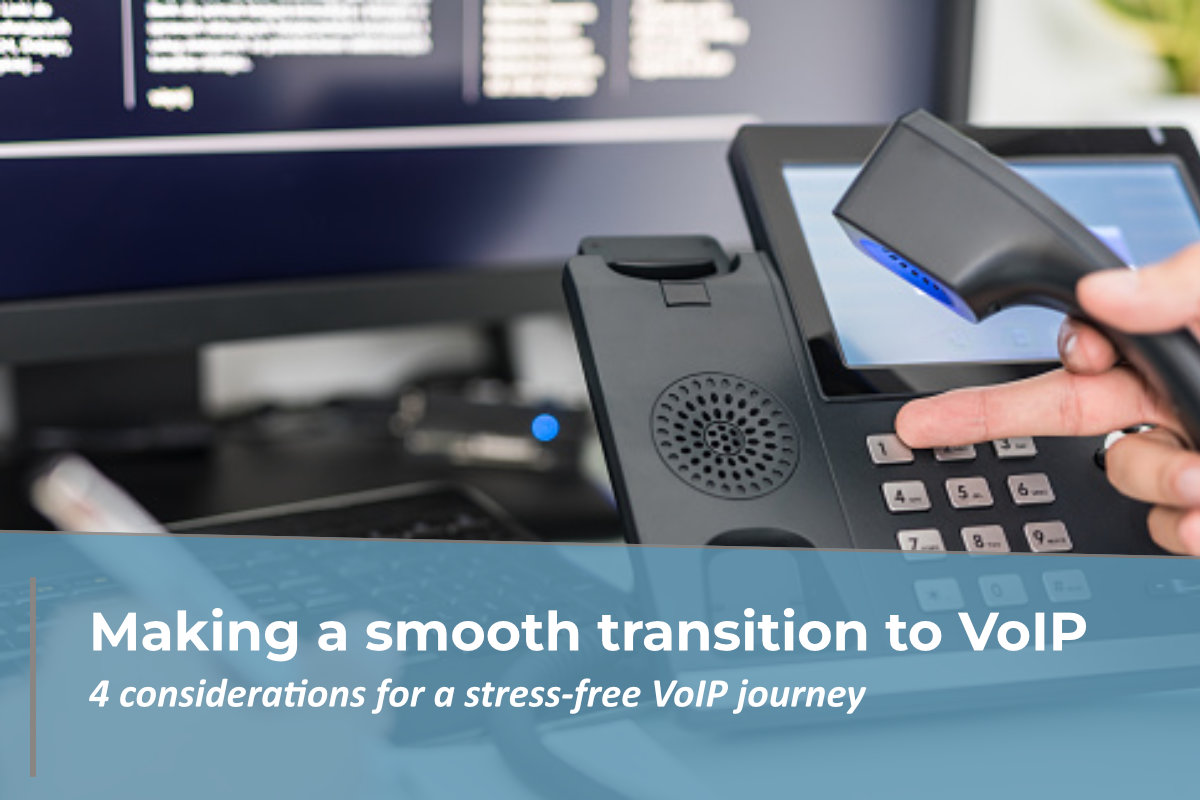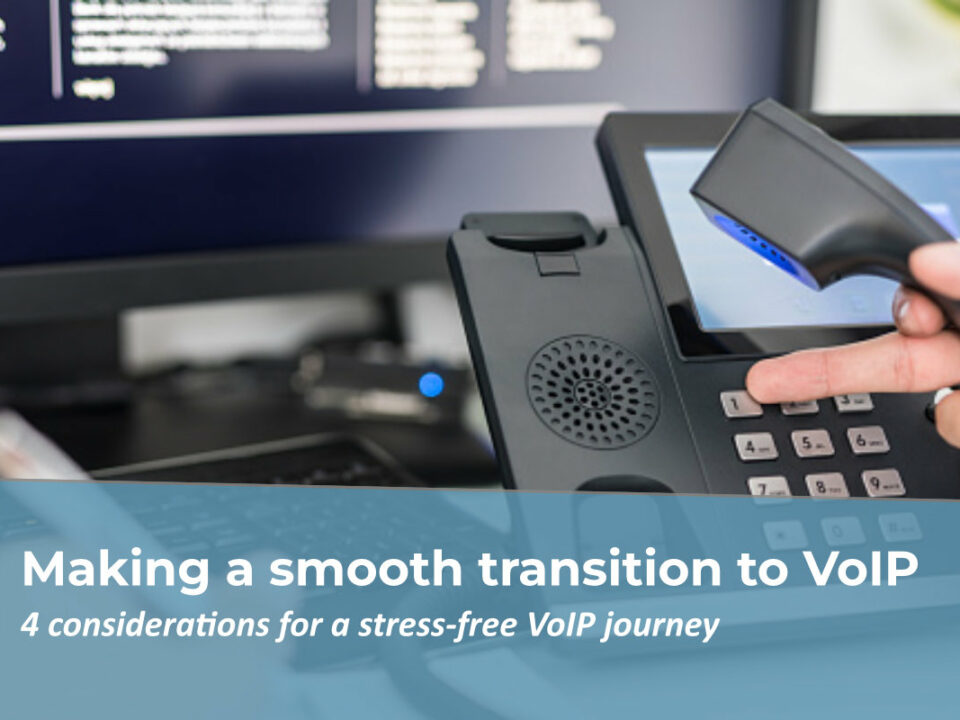
Business Benefits of Artificial Intelligence and Machine Learning
23 September 2022
Making a smooth transition to VoIP – 4 considerations for a stress-free VoIP journey.
7 October 2022Something big is happening in the world of business telephony. Way back in 2015, BT announced its plan to decommission the public switched telephone network (PSTN) by 2025, and discontinue the ISDN products that rely on its infrastructure. This means analogue telephony will become a thing of the past, as from 2025 onwards all telephone calls will be routed via a broadband connection.
This has serious implications for users of legacy phone systems, as these will be unable to make and receive calls when the switch off takes place. However, the digital telecoms transition could affect your business even sooner than 2025, with BT planning to cease the sale of new ISDN products as early as September 2023.
So what is the alternative?
VoIP (Voice over Internet Protocol) is a term used to define standards, technologies and technical protocols which enable the transmission of voice data over IP networks (essentially the internet). VoIP products come in various forms, but can be broadly divided into two distinct categories: SIP trunking and hosted phone systems.
SIP trunking is a good option for businesses keen to make use of an existing on-premise PBX. SIP trunks act as virtual phone lines and allow voice and multimedia data to be transmitted using a broadband connection.
Hosted phone systems function as an out-of-the box private branch exchange, with a VoIP provider hosting and maintaining the underlying infrastructure in the cloud. If your legacy phone system is starting to show its age, hosted VoIP can be a great way to modernise your telephony, and bring a host of features including the possibility of unified communications to your team without any significant capital outlay.
We believe hosted VoIP is the best option for the majority of businesses looking to modernise their communications. Let’s look at 5 of the most compelling benefits of hosted VoIP compared to legacy, on-premise phone systems.
Lower Costs
Hosted VoIP is significantly cheaper to operate compared to a traditional PBX in a number of ways. Firstly, it can (if you wish) be an entirely software-dependent experience. You can purchase VoIP handsets to provide an experience that mimics a traditional phone system, but many users access such systems via “softphones” installed on internet-connected devices such as desktop PCs, laptops and mobile phones. There is no cabling involved when new lines are added and there is no bulky PBX server to maintain: your provider handles the maintenance and security of the system, and it can operate using existing internet connections and the internet-capable devices you already own.
Secondly, hosted VoIP is almost always vastly cheaper in terms of call costs. Internal calls (between users on the same plan) are free, and external calls are significantly cheaper – especially calls to foreign numbers.
Improved flexibility and scalability
Because hosted VoIP is effectively hardware independent, adding new users (lines) requires no upheaval and almost no delay – the process takes minutes. Hosted VoIP is typically offered on a per user, per month basis, allowing your service to closely match the demands of your business – quickly add new users during periods of peak demand, and reduce your bill by removing users when demand slows.
Unite your communications media, and bring data and telephony together.
Many hosted VoIP solutions allow the integration of multiple communication channels into the phone system’s interface, allowing the likes of instant messaging, video conferencing, email and telephony to share a single unified portal. This aids productivity and efficiency, as your team won’t be constantly transferring between apps and devices to communicate with multiple parties.
Some hosted VoIP systems also feature the ability to integrate with enterprise software such as CRMs. This marriage of data and telephony means you can deliver a better customer experience, with insightful data at your fingertips while you’re making a call.
A wealth of features as standard
Transitioning to hosted VoIP can be an easy way cost-effective way to introduce a range of productivity-boosting call handling features to your telephony. Some of the most helpful features on offer include:
- Interactive Voice Recognition (IVR). IVR is an automation technology that allows inbound callers to route themselves to the most suitable agent via prompts and caller inputs. Indispensable when handling high call volumes, IVR puts control in the hands of the inbound caller and directs them to the information or assistance they need as efficiently as possible.
- Call Queues. These streamline the handling of high call volumes by directing calls to available agents on a first-come-first-serve basis. Welcome greetings and on-hold music can be added to improve the customer experience.
- Call groups. This feature allows high call volumes to be shared among a pre-defined group of people, sharing the workload among a team
- Call forwarding. This feature allows call redirect rules to be established to enable the rerouting of calls to another agent if a line is busy or unavailable.
Mobility
Cloud-hosted VoIP lets you carry your office number with you and make and receive calls on it provided you have an internet connection. The location-independent nature of hosted VoIP means you can provide the same call characteristics to your customers no matter where you are. Have calls transferred to you, transfer calls to other member of your team and leverage just one contact number to give inbound callers the same slick experience whether you’re at your desk or out of the office.
From cheaper calls and reduced maintenance overheads to feature-rich calling and intuitive call management, hosted VoIP represents the future of business telephony and offers a variety of benefits when compared to traditional phone systems.
Making the transition to VoIP requires comparatively few infrastructural changes (compared with legacy phone systems), and can be carried out without any disruption to your phone service provided a few simple preparatory measures are taken. In our next article, we’ll outline the few steps that are required to ensure a seamless transition to VoIP.
Bringing better IT to SMEs across the UK
CloudHost Limited was created with the mission to bring better IT support to small and midsize businesses across the UK. Backed by world-class technology, as well as a dedicated and knowledgeable support team, we allow organisations to build, deploy and maintain a feature rich IT environment. Contact us today to learn more. S




